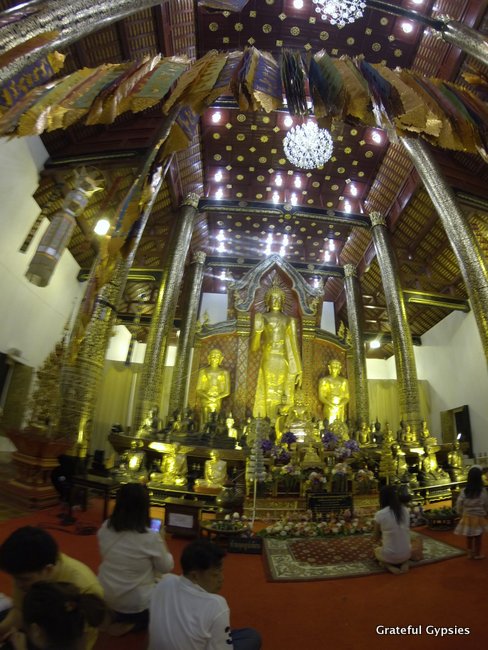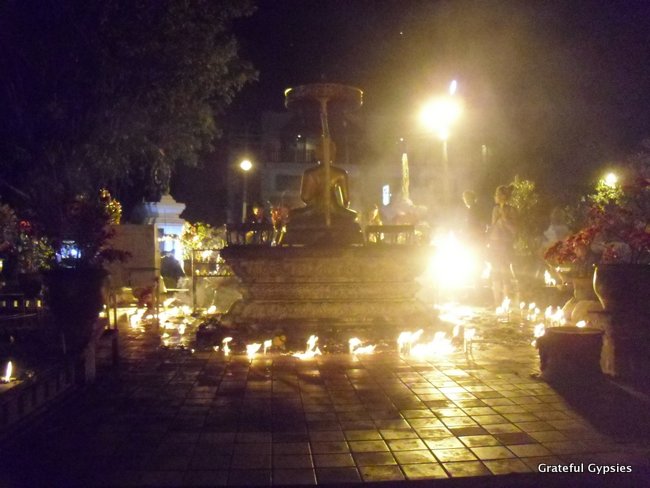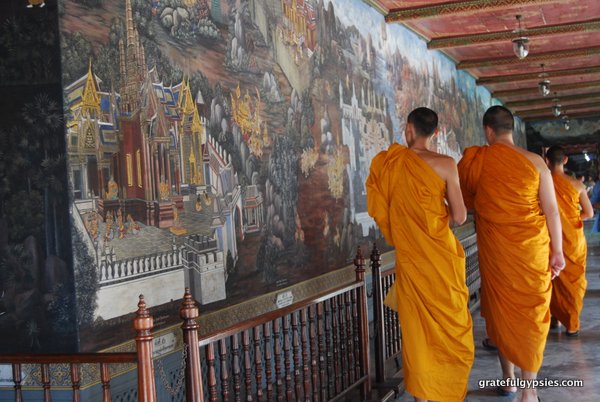Asahna Bucha Day Posted by sasha on Jul 19, 2016 in Culture
Buddhism is a crucial part of Thai culture, as nearly 95% of the population are Buddhists. As a result, many of the country’s most important holidays are Buddhist. Today is one of those days – Asahna Bucha Day (วันอาสาฬหบูชา wan aa-săan-hà-boo-chaa). It’s a public holiday, so people all over the country enjoy a day off to participate in this holy day. Let’s learn a bit more about Asahna Bucha, starting with some background information:
Background

A big day for Buddhists in Thailand.
Falling on the full moon of the eighth lunar month, this day commemorates the Buddha’s first sermon in a deer park in Benares, India some 2,500 years ago. This all-important first sermon of Buddha has a very long official name – Dhammachakkappavattanasutta (ธัมมจักกัปปวัตนสูตร tam-má-jàk-gàp-bpà-wát-ná-sòot) – meaning “The Discourse That Sets Turning the Wheel of Truth.” Try saying that one three times fast! In this sermon, the Buddha preached to five of his associates the doctrine that had come to him following his enlightenment. At the end of the sermon, one of them recounted what they had learned and asked to become a disciple. This established the monkhood (สมณเพศ sà-má-ná-pâyt), which remains a vital part of Thai culture to this day. From this original sermon come the Four Noble Truths which are central in Buddhism. Learn more in this short video:
Customs

Lots of candles.
On this day, people all across the country participate in a variety of ceremonies. Like many other Buddhist holidays, people will visit a local temple to make offerings, listen to sermons, and offer alms to the monks. For Asahna Bucha day in particular, many candles are donated to temples and used in processions in the evening. This tradition dates back to the time before electricity, when extra light was needed during the darker nights of the rainy season.
In the evening, people participate in the wian tian (เวียนเทียน) ceremony – wian (เวียน) meaning “to circle” and tian (เทียน) meaning “a candle.” In this ceremony, people walk three times in a clockwise direction around the temple carrying a lit candle, lotus flowers, and incense sticks. Learn all about this ceremony in this short video from Buddhism Today:
On this day, many people will meditate and try to purify their mind. Some will even stay in the temple for days at a time, chanting prayers and abstaining from immoral acts. Asahna Bucha day is also a popular day for young Thai men to join the monkhood.
Phansa (Buddhist Lent)

Monks at Wat Phra Kaew in Bangkok.
The day after Asahna Bucha marks the beginning of Buddhist Lent, and is known as Khao Phansa Day (วันเข้าพรรษา wan kâo pan-săa). This three month period – often referred to simply as phansa (พรรษา pan-săa) – falls during the rainy season and is a time for monks to retreat to their temples for Dharma study and to avoid unnecessary travel. This is a time of renewed spiritual vigor across Thailand, with many people adopting more ascetic practices for its duration. Similar to how Christians may give something up during lent, people in Thailand may give up eating meat, smoking, or drinking alcohol.
Should you find yourself in Thailand on this important religious holiday, feel free to visit a temple and join in – just be sure to be respectful by dressing and acting appropriately. Brush up on your temple etiquette beforehand and you should be good to go. Thai people are very welcoming and will be glad to include you in the celebrations.

Build vocabulary, practice pronunciation, and more with Transparent Language Online. Available anytime, anywhere, on any device.
About the Author: sasha
Sasha is an English teacher, writer, photographer, and videographer from the great state of Michigan. Upon graduating from Michigan State University, he moved to China and spent 5+ years living, working, studying, and traveling there. He also studied Indonesian Language & Culture in Bali for a year. He and his wife run the travel blog Grateful Gypsies, and they're currently trying the digital nomad lifestyle across Latin America.



